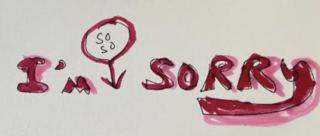Forgiveness
I Apologize for Over-Apologizing
Apologies can be signs of low self-esteem rather than regret.
Posted July 28, 2021 Reviewed by Ekua Hagan
Key points
- Low self-esteem can lead to over-apologizing.
- The more one gains confidence, the less they might need to apologize.
- Apologies are meant to show regret, not to people-please.

Here I am, in the midst of helping my publisher promote my novel, With or Without You, newly out in paperback. I work hard to make sure my posts are not braggy or boring. I add photos or puppets or sometimes Canva movies (yeah, I am a Canva addict), and I work on snappy intros. And every time I post, I always apologize for doing the self-promotion, for asking people to please consider buying and reading my novel because it means so much to me.
Friends catch me on it. We know you have to self-promote, they tell me. Every author does it. Stop beating yourself up. Not every author apologizes for it. So why do you?
Why indeed.
For me, apologizing has been a way of life, my way of giving myself a foothold on the earth, of grabbing hold before I am pushed away. As a child, my being too independent, too secretive, was always a reason for family arguments and shouting, and I ended up asking for forgiveness and promising to be better, which now that I think of it, was really subverting who I really was.
I knew I had to apologize because if I didn’t, people wouldn’t want to be with me. They might even hate me. I began to try to ward that off, apologizing even for something I didn’t do, and I soon found that that could sometimes get me out of a shout-down or punishment. If I really groveled or even brought myself to tears in my apology, my mother would suddenly soften, and then she’d return to be my loving mom. She would hold me close and comfort me, taking control and vanishing my pesky independent streak with kisses. Of course, I got the message that apologetic tears were the keys to getting and keeping love.
But if I got the love of others, my self-love suffered. My feelings of failure grew and grew, even long after the other person had forgotten whatever I was apologizing for in the first place. Instead, I dwelled on it, even as my self-confidence shrank.
Isn’t there a better way, I wondered? (Okay, I sort of agonized.)
I once hurt a beloved friend by not coming over after she was suffering a break-up with her husband because I had a killer deadline. I hadn’t realized I had hurt her until she told me so, two days later. And then I began to apologize, so much, over and over again, that she finally said sharply, “Stop. Stop apologizing. I can’t hear it anymore.”
I hung up, hands shaking, not knowing what to do. And then I realized that sometimes apologies are just words. Maybe we need to hear them, but maybe not ten thousand times. Maybe there is really something better.
With my friend, I bought surprise tickets to something I knew she’d love and showed up to go with her. I still had mountains of work to do, but I insisted we have dinner afterward, too. We didn’t talk once about what had happened, but we didn’t have to. All I had to do was look at my friend’s glowing face to know we were tight again.
Apologizing, like a lot of things, at least for me, isn’t always about what you think it is. For me, over-apologizing was being able to be in the world, as if I had been given permission to take up space, to be who I was. For me, who always felt that any minute someone would be shouting at me or blaming me or mocking me, an apology delivered in advance could soften the blow, or even act like a stop signal. For me, “I’m sorry” sometimes really meant “I’m sorry I exist.” Or “please don’t hate me that I got this award or this rave review because I’m really sorry about having gotten it because it might make you feel badly about yourself.” People-pleasing seems to be my job and it’s an exhausting, undermining confidence-destroyer.
So, what now? I’ve worked hard to be a kind and loving person. To try to imagine that yes, I deserve happiness and success and don’t have to apologize for it, at least not as often as I do. And yes, that when I hurt someone, I can say I’m sorry, but just once, and then I will do something that shows I’m sorry, because actions say so much more than words. I try to be more direct, focusing on the positive rather than the negative. “Thanks for being patient and waiting for me” is surely a better thing to say than, “Sorry, sorry, sorry, I am late again.”
I try to see my apologies now in a different light. I don’t want them to act as Band-Aids, covering up the fact that I’m not and never perfect. I don't want my apologies to just be people-pleasing words. Instead, I want to keep my "I’m sorrys” to one at a time, using them only when they’re really needed.
And, by the way, I’m so, so not sorry that I wrote this piece, though I admit part of me is hoping people will like me for it and not scorn me. But that is about my needing to be more self-confident, less insecure, rather than my regretting an act. And that makes all the difference, right?




